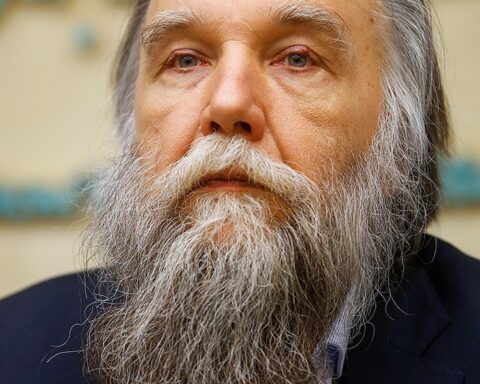By Boethius
I’m not an expert on Aquinas. Any faults about his Ways are mine, not the good Doctor’s. This is a quick overview of his more famous arguments for the existence of God.
St. Thomas Aquinas was born in Italy, and he lived from 1225 to 1274.

He wasn’t just a great theologian and prolific writer, and known as “Doctor Angelicus”, and the father of Thomistic school of theology.
He combined Aristotle dialectic with Christian theology.
I know, that doesn’t sound all that impressive. We can’t see how profound that was because, like fish can’t see the water in which they live, we can’t imagine a world without that. The combination of Athens and Jerusalem has been a cornerstone of Western Civilization. His influence cannot be overstated.
Sadly, most modern ‘thinkers’ have no clue who he was and why their arguments against God are nothing more than the babbling of uneducated fools.
St. Aquinas has dealt with the nattering nonsense that keeps trying to be passed off as science and logic.
His Five Ways, Quinque viae, are still standing, centuries later, as solid arguments for the existence of God. Not proofs of existence, like some keep saying, but an argument for the existence of God.
1. The Argument from Motion.
2. The Argument from Efficient Cause.
3. The Argument to Necessary Being or Contingency.
4. The Argument from Gradation.
5. The Argument from Design.
You can spend a lifetime examining his arguments. We’re not going to do that here. I’m aiming for a more broad overview of the Big Five.
One core idea that Aquinas builds on is Aristotle in nature, the difference between potentiality and actuality. The idea is something can exist in one state or the other, say a rock on top a hill. It has the potential to roll down the hill, but it cannot do so on its own. If another force, a mover, pushes the rock, then it will actually roll down the hill.
The First Way:
“The first and more manifest way is the argument from motion. It is certain, and evident to our senses, that in the world some things are in motion. Now whatever is in motion is put in motion by another, for nothing can be in motion except it is in potentiality to that towards which it is in motion; whereas a thing moves inasmuch as it is in act. For motion is nothing else than the reduction of something from potentiality to actuality. But nothing can be reduced from potentiality to actuality, except by something in a state of actuality. Thus that which is actually hot, as fire, makes wood, which is potentially hot, to be actually hot, and thereby moves and changes it. Now it is not possible that the same thing should be at once in actuality and potentiality in the same respect, but only in different respects. For what is actually hot cannot simultaneously be potentially hot; but it is simultaneously potentially cold. It is therefore impossible that in the same respect and in the same way a thing should be both mover and moved, i.e. that it should move itself. Therefore, whatever is in motion must be put in motion by another. If that by which it is put in motion be itself put in motion, then this also must needs be put in motion by another, and that by another again. But this cannot go on to infinity, because then there would be no first mover, and, consequently, no other mover; seeing that subsequent movers move only inasmuch as they are put in motion by the first mover; as the staff moves only because it is put in motion by the hand. Therefore it is necessary to arrive at a first mover, put in motion by no other; and this everyone understands to be God.”[1]
Things do move. We see them moving. Something has to move the thing moving. Potentiality is only moved by actuality. Something can’t exist potentially moving and actually moving. So a potential depends on an actual to change it to an actual. There has to be something that does not need to be moved, that moves all things, and that is God.
This isn’t what most think it is. This is not an argument for a beginning of a temporal series. The Unmoved Mover, in this case, is above the lower elements of the set. Aquinas jumps categories, from things that are contingent to a non-contingent entity. There has to be a change in categories because the non-contingent entity is fundamentally different than contingent things. Aquinas will make use of this idea again.
Because this is only talking about contingent things, Aquinas says only contingent things have a start to their movement.
Second Way:
“The second way is from the nature of the efficient cause. In the world of sense we find there is an order of efficient causes. There is no case known (neither is it, indeed, possible) in which a thing is found to be the efficient cause of itself; for so it would be prior to itself, which is impossible. Now in efficient causes it is not possible to go on to infinity, because in all efficient causes following in order, the first is the cause of the intermediate cause, and the intermediate is the cause of the ultimate cause, whether the intermediate cause be several, or only one. Now to take away the cause is to take away the effect. Therefore, if there be no first cause among efficient causes, there will be no ultimate, nor any intermediate cause. But if in efficient causes it is possible to go on to infinity, there will be no first efficient cause, neither will there be an ultimate effect, nor any intermediate efficient causes; all of which is plainly false. Therefore it is necessary to admit a first efficient cause, to which everyone gives the name of God.”[1]
In some ways, this is another angle to his First Way. Nothing can cause itself, it would have to pre-exist itself to do so. So anything caused has to have a cause. You can’t have an infinite number of causes because something along the way has to change the potential causes into actual caused. There might be more than one intermediate causes, but they, too, can’t stretch into an infinite series for the same reason. So there has to be another category above causes and caused, an Uncaused Cause, which we call God.
How long of a paint brush would you need to get it to paint by itself? A meter? 100 meters? An infinite length? The answer is there is no length that will change the potential nature of the brush to an actually painting brush. It will require a mover, a cause, to do so.
Movement and cause are the same, and that which is contingent has to rely on a non-contingent entity to become actual and caused. Again, this isn’t a temporal series. It can apply to those, but the underlying requirement is the Uncaused Cause, the Unmoved Mover, which is in a different category than contingent things.
The Third Way is another angle, like the first two, but he really brings out the need for a non-contingent entity:
“The third way is taken from possibility and necessity, and runs thus. We find in nature things that are possible to be and not to be, since they are found to be generated, and to corrupt, and consequently, they are possible to be and not to be. But it is impossible for these always to exist, for that which is possible not to be at some time is not. Therefore, if everything is possible not to be, then at one time there could have been nothing in existence. Now if this were true, even now there would be nothing in existence, because that which does not exist only begins to exist by something already existing. Therefore, if at one time nothing was in existence, it would have been impossible for anything to have begun to exist; and thus even now nothing would be in existence – which is absurd. Therefore, not all beings are merely possible, but there must exist something the existence of which is necessary. But every necessary thing either has its necessity caused by another, or not. Now it is impossible to go on to infinity in necessary things which have their necessity caused by another, as has been already proved in regard to efficient causes. Therefore we cannot but postulate the existence of some being having of itself its own necessity, and not receiving it from another, but rather causing in others their necessity. This all men speak of as God.”[1]
These first three ways are profound enough to answer the blathering ninnies that run about saying stupid things like “If everything has a cause, then what caused God?” and “What if the Universe is of infinite time, Bible boy? What then?”
The first question shows the utter lack of education possessed by the degreed. Aquinas doesn’t argue everything has a cause, but that everything contingent has a cause. If you are talking with someone that makes that argument, you should kindly point out that no serious philosopher has made that argument, especially not Aquinas. Or Aristotle. Or even William Lane Craig.
If the person persists in maintaining that’s the argument, he’s not arguing from good faith. He’s intellectually dishonest, and you may treat him as such. Dialectic arguments should only be used to explode his pseudo-dialectic mutterings. Use rhetoric to strike against his emotions. Stick to the truth. You’ll do fine.
If he accepts your correction, you could end up having a delightful discussion with him.
The second question isn’t quite as cut and dried. Aquinas makes an argument for a single act of creation, but he also argues such an event isn’t needed. The tricky part is understanding Aquinas’ argument for God is not one of a temporal series in of itself, but that God, the Unmoved Mover, the Uncaused Cause, the Necessary Being, is fundamentally different than anything that isn’t Him. He is a different category altogether. If the Universe has begun to exist, then it there needs a Cause that is Uncaused. I know, dead horse. And for everything in the Universe, there needs be a Necessary Being to uphold all existence, because if something can not exist at one point, it lacks the ability to self-exists.
If the Universe has always existed (or even an infinite number of Universes) then there needs be a Necessary Being to uphold all existence. It doesn’t matter if there is a beginning or not to the Universe, everything contingent needs to be upheld moment to moment by the Necessary Being.
“Fine, but what about a quantum field fluctuations?”
Same answer.
See, the problem is at this point the person arguing against God while trying to use science is barking up the wrong category. God’s involvement is metaphysical, above nature, also know as supernatural. Using contingent factoids cannot prove or disprove arguments from a metaphysical category.
The words ‘possibility’ and ‘necessity’ have to be understood in the context of Aquinas’ time.
‘Possibility’ is used in the Aristotelian sense. That is, the hylemorphic composite nature of something that can possibly be and not to be. This nature is inherent. Whatever form something has now, if it has hylemorphic nature, it will fail to exist in that form given enough time. It lacks the potential for indefinite existence.
By ‘Necessity,’ he means the opposite of possibility: something that by its nature is everlasting. It cannot cease to exist no matter how much time passes. It cannot change into something it is not. By its very nature, for example, it cannot become contingent.
His argument starts with establishing the fact that if the hylemorphic somethings of the Universe, be it an entity or an action or a cause or an event or whatever, at some point, given infinite time, never existed, and, again given infinite time, all things would have never existed, and we wouldn’t be here arguing about why are we here.
He says that’s absurd, and because we are here, something has to have Necessary Being, which means something that exists is non-temporal and non-contingent. Here he uses ‘being’ to mean ‘being as existence’ and as a ‘supreme being that men call God’ — “I am that I am” — which is of itself Being. He uses being not as one being among other beings, but being qua being. I’m not an expert in Latin, but the tricky passage is here: “Ergo necesse est ponere aliquid quod sit per se necessarium, non habens causam necessitatis aliunde, sed quod est causa necessitatis aliis, quod omnes dicunt Deum.” “Sit per se” isn’t complete by itself, so we have to look at “necessarium” as well, and that all roughly translates into being as an abstract which has its own necessity, it’s own everlastingness.
It’s this Necessary Being that sustains all Possible things.
So his argument then takes care of the Universe always existing, the Universe contracting and expanding forever, and multi-universes for the same reason.
The guy arguing against God needs to engage the actual arguments made by Aquinas at the same level in order to be rational. Anything less is dishonest.
Fourth Way:
“The fourth way is taken from the gradation to be found in things. Among beings there are some more and some less good, true, noble and the like. But ‘more’ and ‘less’ are predicated of different things, according as they resemble in their different ways something which is the maximum, as a thing is said to be hotter according as it more nearly resembles that which is hottest; so that there is something which is truest, something best, something noblest and, consequently, something which is uttermost being; for those things that are greatest in truth are greatest in being, as it is written in Metaph. ii. Now the maximum in any genus is the cause of all in that genus; as fire, which is the maximum heat, is the cause of all hot things. Therefore there must also be something which is to all beings the cause of their being, goodness, and every other perfection; and this we call God.”[1]
Like his other Ways, this is just a summary of his arguments, he spent hundreds of pages explaining the “why God has to be Good” and not just anything. This is not a quantitative argument about sums and magnitudes but one of transcendental perfection. To treat this as the extent of his argument is either ignorant or dishonest.
For example:
“That’s an argument? You might as well say, people vary in smelliness but we can make the comparison only by reference to a perfect maximum of conceivable smelliness. Therefore there must exist a pre-eminently peerless stinker, and we call him God. Or substitute any dimension of comparison you like, and derive an equivalently fatuous conclusion.” — Richard Dawkins, The God Delusion
Q.E.D.
Fifth Way:
“The fifth way is taken from the governance of the world. We see that things which lack intelligence, such as natural bodies, act for an end, and this is evident from their acting always, or nearly always, in the same way, so as to obtain the best result. Hence it is plain that not fortuitously, but designedly, do they achieve their end. Now whatever lacks intelligence cannot move towards an end, unless it be directed by some being endowed with knowledge and intelligence; as the arrow is shot to its mark by the archer. Therefore some intelligent being exists by whom all natural things are directed to their end; and this being we call God.”[1]
This is common sense, which explains why most learned men of our age have no idea what point Aquinas is making here. That which lacks intelligence cannot have a purpose. Unintelligent things act according to laws set for them. Intelligence precedes laws. So that which has set the laws by which all things are governed we call God.
Since we don’t know for certain what the physical laws were like during the first blip after the Big Bang, we can’t describe how things worked. But again, God is above that, He had laid down governance for those initial conditions as much as He did for the material Universe after. All things operate according to His will.
The implications should be clear. No matter what law is discovered by man’s questing, it cannot supersede God. There is no God of the gaps for Aquinas. God is above and below all.
To summarize, Aquinas argues for some Being that is above everything as the First Cause, the Unmoved Mover, and is the fundamental source of everything, the Necessary Being. The Alpha and the Omega, who men call God. He exists in a different category than everything else in the Universe and is not just one entity among many.
Every time someone makes an argument against God and either doesn’t address Aquinas or does so incorrectly, despite being corrected, you know they are not arguing honestly.
No fact of the physical universe can prove or disprove God. No law, no factoid, no wild-eyed claims of quantum field fluctuations can address the wrong category.
So why aren’t these Ways considered proofs? Aquinas set out to defend the belief in God as being philosophically rational at a metaphysical level, not something empirically provable, by merging Athenian logic and Jerusalem belief.
In this benighted age, where Science uber alles is the mode de jour of all right-thinking people, this is nigh well unconceivable. It’s claimed that science encompasses all knowledge including metaphysics, which is an absurd position to take since that means science also includes astrology and the rules to croquet.
The Five Ways aren’t arguments for Jesus being the Son of God, however, or that the Bible is the Word of God, but that there are rational reasons why to accept the existence of a Supreme Being, who men call God.
This was just a quick flyby at 30,000 feet. Aquinas was a prolific writer, and he explores these ideas further in many books and hundreds and hundreds of pages.
If this has piqued your interest, I suggest checking out Professor Edward Feser at http://edwardfeser.blogspot.
Read Aristotle’s Metaphysics and of course, the Summa Theologica.
[1] Infogalactic : https://infogalactic.com/info/








“But if in efficient causes it is possible to go on to infinity, there will be no first efficient cause, neither will there be an ultimate effect, nor any intermediate efficient causes; all of which is plainly false.”
In your summary of this argument, you covered the issue with there being a start or intermediate cause in an infinite series of causes, but you skipped over one more aspect which was interesting – we should not find an end.
In an infinite series, any point you designate as the “end” would be the cause of another effect, so there is no end. But that’s not the world we live in – however complex the Rube Goldberg machine we build, it runs out of steps and comes to a stop.
Finding any end implies a finite series of causes.
Thank you for pointing that out.